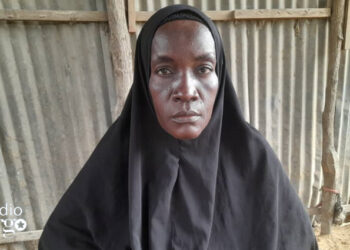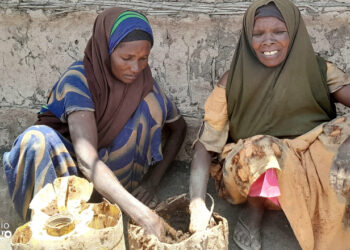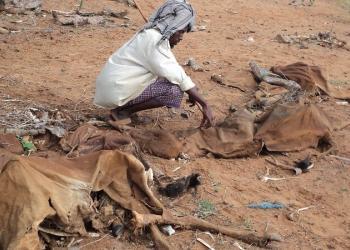(ERGO) – A voluntary committee of displaced people in Baidoa is running a thriving initiative that links male and female job seekers in the camps with employers offering various forms of manual labour for daily or monthly pay.
The type of work being found includes construction, domestic jobs, and casual labour. Those being placed in work are among the most vulnerable without any other source of income to support their families.
Ise Maalim Ali, 44, has been working on house building sites since June and is making four dollars a day that supports his family.
“Now my family’s life is very good. I work, my children eat three meals a day, and the hardships we faced before are gone, thank God. I’m working to improve my children’s lives, their clothes and food, and God has made it easy for me. I no longer have any worries,” he said.
He said the job had restored his hope and given him some stability for the first time during his displacement.
Ise can afford to buy three jerry cans of water daily from a donkey cart bringing water from a well four kilometres away, for 9,000 Somali shillings. He used to have to beg for small amounts of water from neighbours, as there is no borehole in the camp.
He enrolled three of his four children for the first time in education in July, paying $15 a month for Koranic and primary schooling.
“I’ve learned about construction work, carrying stones, sand, and other materials,” he said. “I now earn 100,000 shillings a day. This job has greatly changed our lives. My children are in school now, but when I was unemployed, we couldn’t even find food. Life was very hard.”
Ise arrived in the IDP camps in Baidoa in May 2024, after conflict and drought forced his family to flee Dinsor district. Their two-hectare rain-fed farm growing beans, maize, and sorghum completely failed.
For months he looked for work in Baidoa and finally heard about the committee connecting displaced people with local labour opportunities and registered in February.
He has managed to save $50 and clear a debt of $80 debt he had sat on for nearly a year.
“I’m free now from the pressure of debts,” he said proudly. “I’ve even started saving little by little.”
The initiative has also helped Mumino Mukhtar Ahmed, a mother of seven, who is now working for a family in Baidoa, cleaning, washing clothes, and cooking for $100 a month.
“The problems we had before are over. I used to worry about food, clothing, and school for my children. Some nights they slept hungry, but that’s behind us,” she said.
Mumino lives in Warishe camp, an hour’s walk from Baidoa town, and leaves home at 7 AM returning at 5 PM. Her husband is blind, and their children are young, so her role as the sole breadwinner means she is ready to face the tough conditions.
Since starting her job in June, she has been able to repay a $100 food debt and save $30 for her children’s needs.
“My biggest dream, if God makes it possible, is to build a house and move out of this makeshift shelter so my children can have a decent home. That’s my greatest hope,” she said.
She has enrolled four of her children in school paying $20 monthly. Her family now eats three meals a day, whereas they had been begging for just one meal.
Mumino’s family fled rural Bay region in 2023, after drought killed 29 of their goats and destroyed their three-hectare rain-fed farm.
The chairman of the committee, Ibrahim Abdullahi Isaaq, said more than 500 displaced people had found jobs in the past five months through their initiative.
“We place people where there’s work and personally guarantee them as reliable workers. We tell employers these are trustworthy people ready to work, and they’re accepted based on our recommendation. They perform well and we’ve never received any complaints. We also find them road cleaning and sanitation work,” he said.
The committee collaborates with local businesses, cooperatives, local authorities, and organisations to place people in work. Despite the success, however, the number of displaced people who have secured jobs is small compared to those needing work.
“If our efforts reach further this could be a real solution for thousands of displaced people struggling in camps, especially now that aid has declined in recent years,” Ibrahim said.












